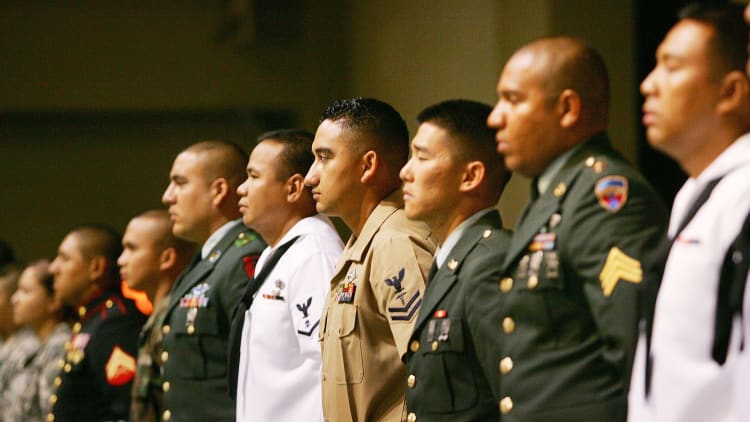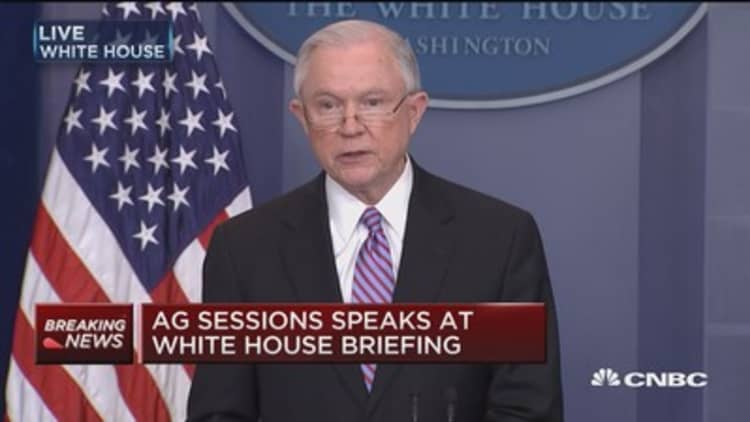Before Donald Trump was elected US president, Eulalio Vasquez was doing a good job of living the American dream. A native of the Dominican Republic, he arrived in New York aged 18, worked in a supermarket, a Nabisco factory and ultimately found a commercial niche lifting the spirits of his fellow immigrants in the south Bronx.
He began as a clown, performing at children's birthday celebrations at weekends. That led to opportunities to sell party supplies and then to run a hall that specialises in the elaborate baby showers popular in the Hispanic community: fiestas with food, drink and music on the scale of a wedding.
But business slowed for Mr Vasquez after Mr Trump gained power. Unnerved by a president who had called for the mass deportation of undocumented immigrants, Hispanic families once willing to fork out $5,000 or more on baby showers began cutting back, bringing their own food and decorations to parties instead of buying them from Mr Vasquez. He reckons his revenues have fallen 30 to 40 per cent.

"They say, 'Just give me the basics'," says Mr Vasquez, who is now a 47-year-old US citizen with a family of his own. "A party is not a necessity and they are afraid of being deported. The business has been hit very hard."
Mr Vasquez has plenty of company in Hispanic business circles. Mr Trump's election in November has led to a sharp fall in consumer spending in the communities that are home to the estimated 11m undocumented immigrants in the US — a majority of them Hispanic — as well as tens of millions of others with whom they share bonds of blood or country, according to executives familiar with the market.
From New York to California, officials of Hispanic chambers of commerce contacted by the Financial Times say double-digit revenue declines are becoming common at "mom and pop" retailers, bars, restaurants, nightclubs and a variety of service providers in immigrant neighbourhoods.
More from the Financial Times
Germany and France pledge to accelerate eurozone reforms
Oil market awaits 'whatever it takes' details as Opec gathers
Government enforcers take aim at compliance officers
Many Hispanic consumers are too scared to spend as they once did, say the business leaders who know them best. They are saving money in case they or their loved ones are swept up — rightly or wrongly — in the president's crackdown on undocumented immigrants. They are avoiding businesses they think will be targeted by immigration agents — either because they are undocumented themselves, or because they fear being perceived as such and subjected to the attendant humiliation.
"For our businesses that serve the Hispanic immigrant community as customers, they are telling us that their business is down anywhere from a third to a half," says Carlos Gomez, president of the Hispanic Chamber of Commerce of Greater Kansas City, which represents 480 businesses in the states of Missouri and Kansas. "The immigrant community is very afraid. They don't know what is going to happen. My feeling is that people go to work and go home. They don't want to be out."
The mood of the Hispanic community matters to marketers because of its size and youth. An estimated 57m Hispanics live in the US and the Census Bureau expects that number will grow to 119m by 2060. About 60 per cent of Hispanics are members of the millennial generation or younger, according to a report last year by the Pew Research Center, making them the youngest major racial or ethic group in the US.
A sign at a bus stop offering immigration services in Jackson Heights, New York. Businesses in heavily Hispanic areas have reported a slowdown as locals fear being caught up in raids © Getty
By 2020, Hispanic buying power will reach $1.7tn, according to the University of Georgia's Selig Center for Economic Growth. In recent years, leading US companies ranging from Walmart to McDonald's and Ford have spent billions of dollars collectively on marketing aimed at winning over Hispanic consumers. In 2015, Target launched a US advertising campaign based on Spanish words that have no English translation.
"The Hispanic market is driving the growth of a majority of categories from financial to retail to automotive to telecoms," says Linda Lane Gonzalez, chairman of the Association of Hispanic Advertising Agencies and president of her own marketing company in Miami. "For the past 10 to 15 years, it has been a business imperative."
A more fearful and furtive Hispanic consumer is bad for corporate America. The development also creates complications for investors trying to track retail activity. A mystery of the Trump era has been the disparity between data showing rising consumer confidence and sales figures suggesting they are pinching their pennies. Millions of Hispanic consumers retreating into the shadows could be part of the explanation.
"It is very likely that we are surveying fewer of them and we are getting a worse measure of their sentiment," says Giovanni Peri, an economist at the University of California, Davis, who specialises in migration issues. "This is a new situation, the last five months."
Anxiety grows
Mr Trump began worrying Hispanics as soon as he announced his candidacy in 2015, pledging to build a wall along the Mexican border to keep out "killers" and "rapists" he said were arriving from points south. During his campaign, he called for a nationwide deportation force to expel as many undocumented immigrants as possible. Although his administration has backed away from mass deportations, Immigration and Customs Enforcement officers made 41,318 arrests during the first three months of the Trump presidency, up 38 per cent from the same period of 2016.
Anxieties have reached the point where immigrants in Hispanic communities are failing to report rapes and other crimes for fear of attracting the attention of the authorities, according to police in cities such as Los Angeles and Houston. Law enforcement officials and community activists alike say they fear that the results could make the streets of immigrant areas less safe.
"All these people talking about law and order will give more power to the criminal elements," says Angelica Salas, executive director of the Coalition for Humane Immigrant Rights in Los Angeles. "What people don't see is that vulnerability and that lack of trust in any authority. You are giving more power to the unscrupulous."
Marketing executives familiar with the Hispanic community say the impact of Mr Trump's immigration policies extends well beyond the ranks of the undocumented, a category that includes 5.6m Mexicans, 1.8m Central Americans, 650,000 South Americans and 450,000 people from Caribbean countries, according to Pew.

Probably another 25m-30m Hispanics in the US, about half of the total population, have their papers in order but are related to someone who is undocumented, says Carlos Santiago, president of an eponymous consultancy that has advised companies such as Unilever, Procter & Gamble, Walmart and AT&T on multi-cultural marketing.
Deportation looms as "a family challenge" in the Hispanic community, potentially requiring people to provide financial assistance to an undocumented relative or care for children other than their own, Mr Santiago says. Before Mr Trump was elected, he adds, surveys showed Hispanics were generally more optimistic about their economic prospects than non-Hispanics. Now, the opposite is the case.
"When we look at the numbers on optimism we can discern that this is not only an issue touching the less acculturated or the recent immigrants," Mr Santiago says. "It could be their grandparents or their second generation [who are undocumented]. They all feel that they are not welcome in this country."
The pressure on Hispanic families comes at a particularly sensitive time, according to Nancy Tellet, a market researcher and chair of the AHAA research committee. Even before Mr Trump's election, she says the trauma of the financial crisis was causing Hispanic millennials to lose trust in institutions and instead put their faith in family — blood relatives in particular. So dramatic was this "narrowing of trust circles" that she found Hispanic millennials were "distrusting marital partners and delaying marriage".
A protest outside an immigration detention centre in Elizabeth, New Jersey, in February © Getty
In this context, the possibility that an undocumented relative will be deported becomes "the ultimate fear — the fear of families being torn apart", she says. "People say [during interviews] that family is where your happiness comes from, where your satisfaction comes from. People would say, 'I don't have friends, I have cousins'."
Under Mr Trump, the level of trust in immigrant areas has deteriorated even more, said Eduardo Giraldo, a Colombia-born insurance agent in the New York borough of Queens. A past president of the local Hispanic Chamber of Commerce, he has been working with other business leaders to discourage immigrants from withdrawing funds from banks and keeping cash in their homes, warning that the money could be confiscated if they were deported.
Adapting to a new reality
Next door to Mr Giraldo's second-storey office in the polyglot Jackson Heights section of Queens, Santanu Barua, a Bangladeshi, is facing a similar crisis of confidence. Business is down 20-30 per cent at the tutoring centre where he teaches because immigrant parents "are a little confused" about what awaits them under Mr Trump, he says. Their children worry, too, about whether they can stay in the US.
"The little kids didn't know it before," he says. "But they do now."
Elvis Silverio, a Dominican-born nightclub owner in Jackson Heights, says he is finding that immigrants no longer even want to work in an immigrant area. He suspects they think it is safer to take construction jobs in less Hispanic parts of New York.
"I called the other day to the employment agency for a line cook and no one came over," he says. "They are afraid to go into areas that are going to be hit by immigration."
How long the bad times will last is a matter of debate in the Hispanic business world. Mr Santiago, the marketing strategist, suspects that many immigrants will eventually give in to "cabin fever" and start going out again, provided the political situation does not deteriorate further.
In the meantime, there is little to do but adapt to circumstances. Erasmo Ponce, a native of Mexico known in New York as the "tortilla king", says he is selling his wares in Canada to make up for a local decline in business. Bars and restaurants that once ordered three cases at a time — each with 960 tortillas — have scaled back to one or two.
"Production isn't going down because we are sending [tortillas] outside the US," he says. "We are looking for new customers. We are using social media."
Mr Vasquez, the Bronx clown-turned- party organiser, says he is spending more money on advertising and is handing out flyers promoting his business. Mr Giraldo, the Queens insurance agent, says such resilience can be expected from people who often have survived harder times in their homelands.
"That's why New York didn't get down after 9/11," he says. "The immigrants have seen killings and bombs and tanks. They were the ones who were willing to go back to work. People can like it or not like it, but these communities are here to stay."
Watch: Sessions says we shouldn't protect immigration felons


